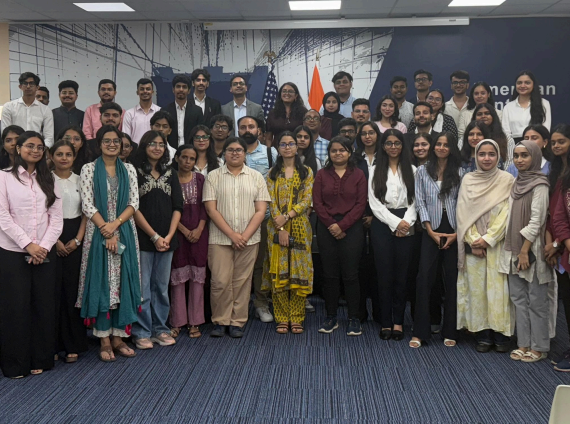Ms. Eerishika Pankaj, Director, ORCA was invited to speak in a dialogue on “Navigating the Indo-Pacific and the QUAD”, held on June 20, 2025, at the American Centre of the US Embassy, New Delhi. The event was co-organised by The American Centre and The Geostrara.
The dialogue reflected on the dynamic and layered geopolitical developments across the Indo-Pacific, with a special focus on normative frameworks, economic diplomacy, and the evolving role of minilateral arrangements like the QUAD.
Ms. Pankaj highlighted the Indo-Pacific’s transformation not only as a theatre of strategic competition but as a space for contesting norms and frameworks of governance. She noted that the Indo-Pacific today is as much about who defines the rules as it is about who deploys power. With debates around data governance, maritime transparency, and infrastructure financing at the center of this new form of contestation.
Drawing from her time as a Fellow of the U.S. State Department–funded QUAD Leaders Lead on Demand Program, she emphasized that the QUAD’s core strength lies not in hard deterrence but in “soft ordering”. Its capacity to shape perceptions of legitimate behavior and embed emerging challenges like clean technology, supply chain resilience, and maritime data sharing within a normative framework rooted in transparency, inclusivity, and international law.
She further argued that the QUAD’s internal divergences in how its four member countries perceive and engage with China, are not a weakness, but a strategic asset. These divergences have enabled the QUAD to remain flexible, non-prescriptive, and issue-based, distinguishing it from rigid security alliances and lending it greater legitimacy in a region marked by nuanced alignments.
The dialogue was a conversation between Ms. Pankaj and Mr. Afaq Hussain, Co Founder & Director, Bureau of Research on Industry and Economic Fundamentals (BRIEF), who focused on the economic landscape of the Indo-Pacific, with particular emphasis on infrastructure diplomacy.
Together, both speakers offered a holistic view of how the QUAD and wider minilateral formats are reshaping both strategic norms and economic architectures in the Indo-Pacific.


